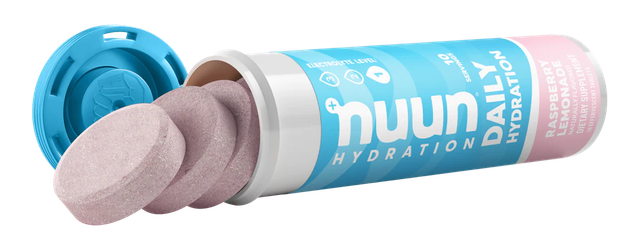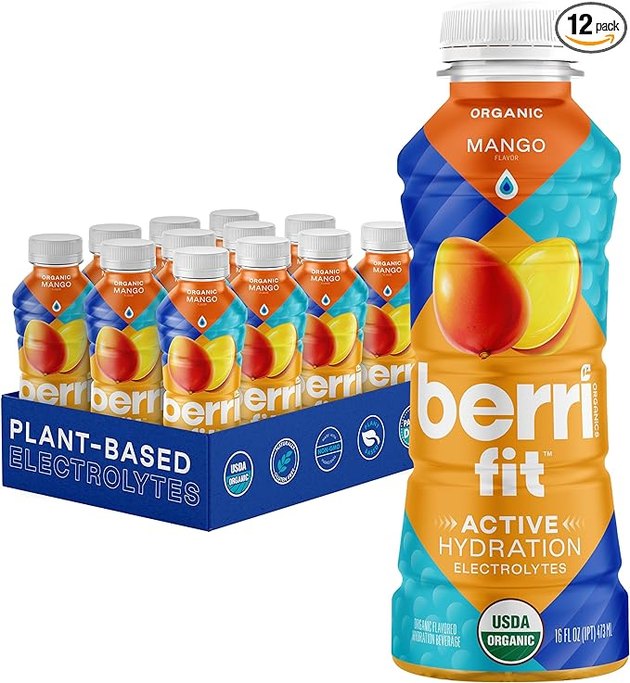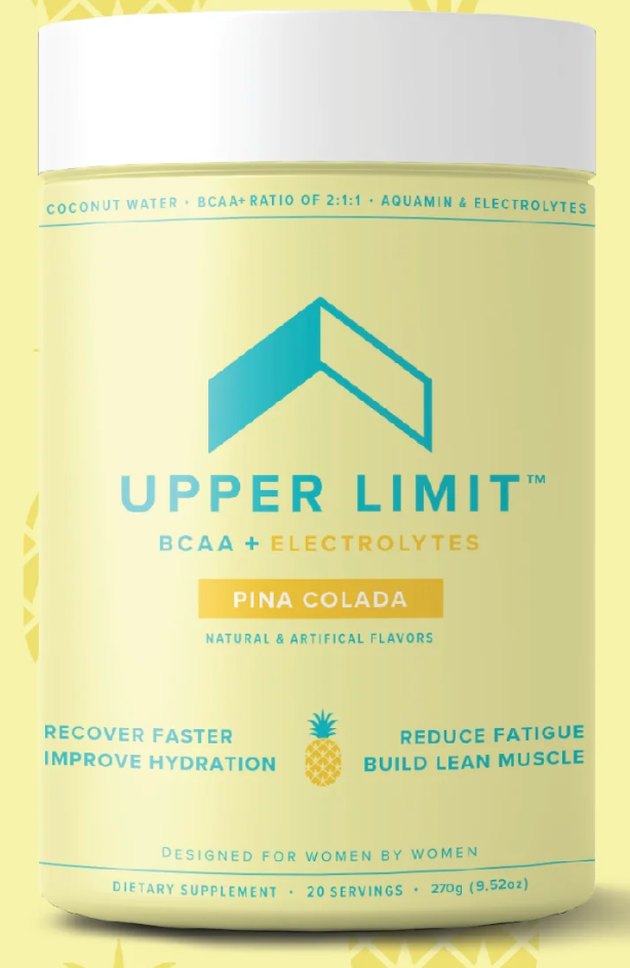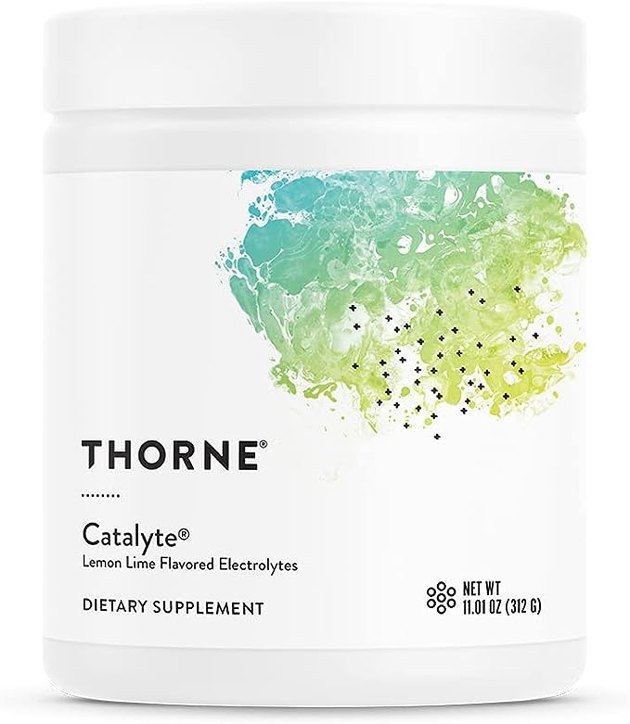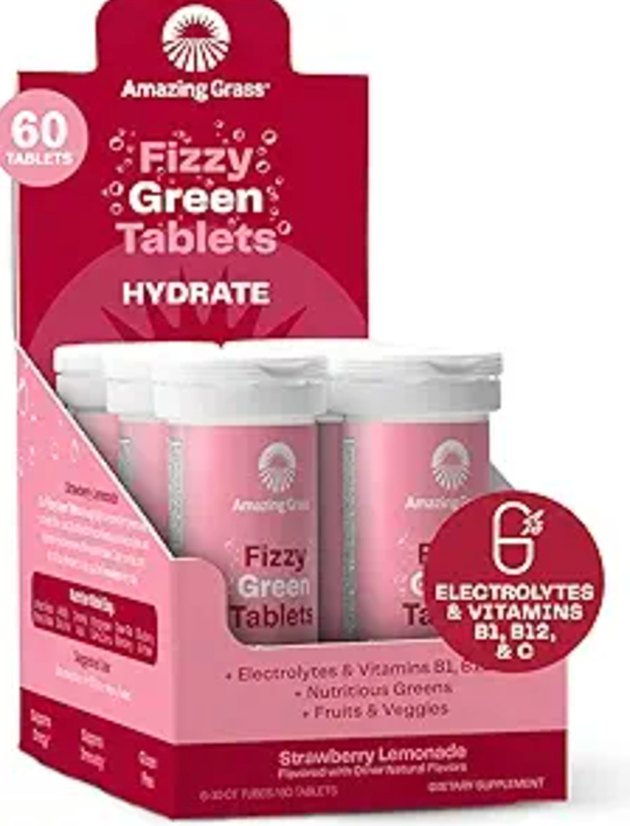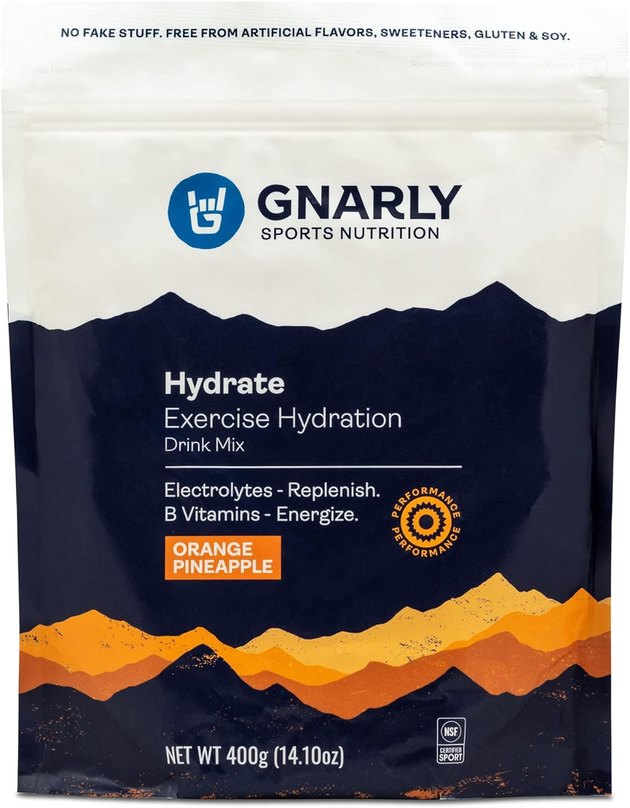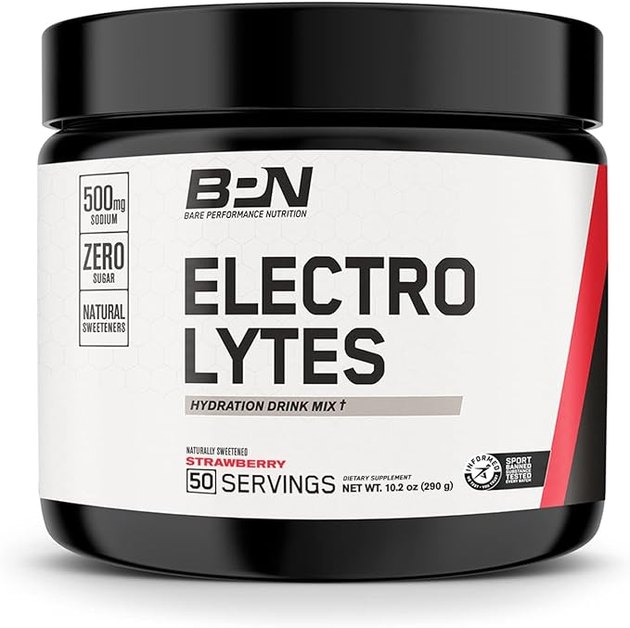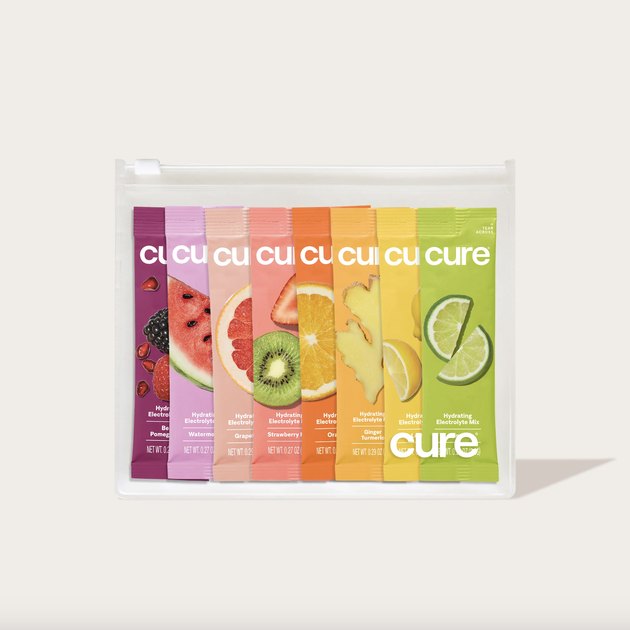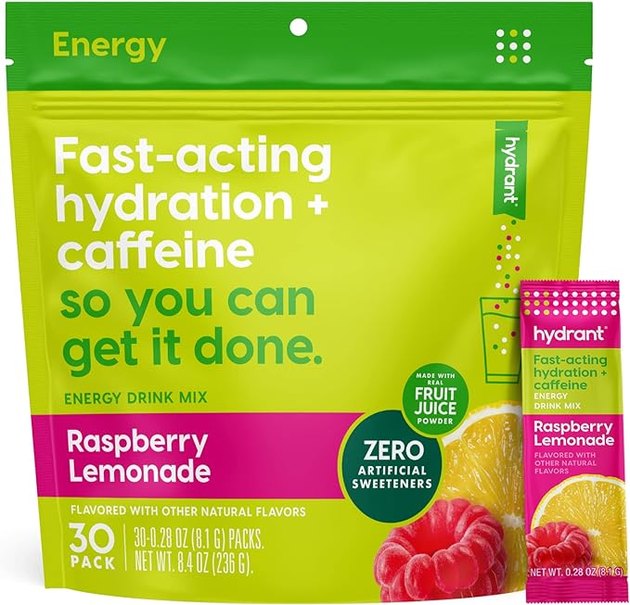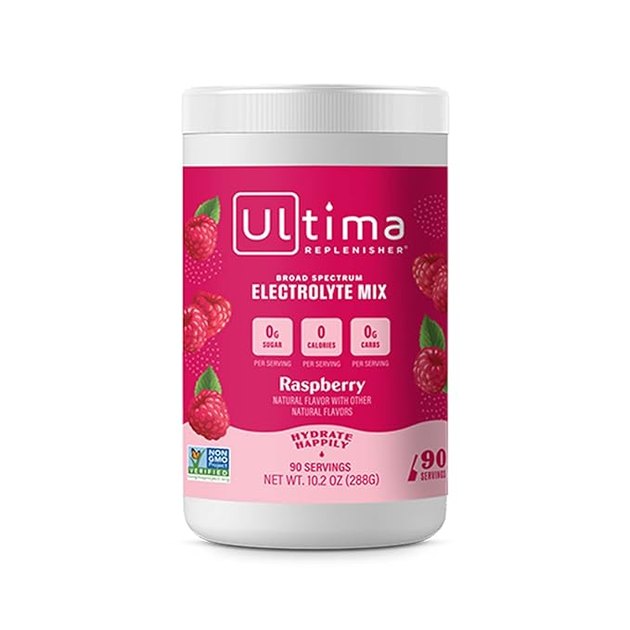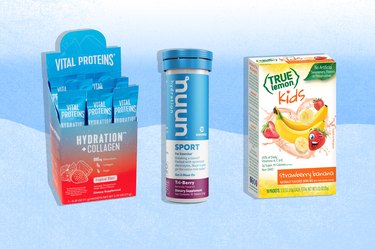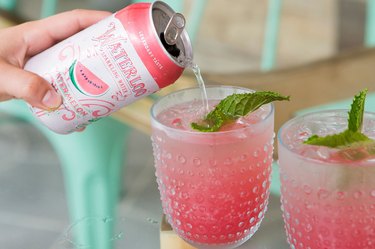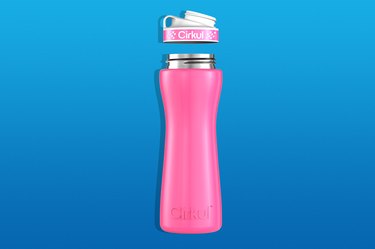
For those times when water just doesn't cut it, you'll want to keep an electrolyte supplement on hand.
Here's why: When you sweat a lot, you lose minerals — mostly sodium, but also potassium, magnesium, calcium and chloride. And these are the electrolytes traditionally found in electrolyte supplements and drinks.
Video of the Day
Video of the Day
Electrolyte drinks can help replenish your electrolytes after a hard workout — think: a long run, a strenuous gym session or a hard hike. But they can also be beneficial for when you're fighting off an infection or when you're traveling to high-altitude locations, says Jordan Hill, RD, CSSD, a sports dietitian with Top Nutrition Coaching.
Replenishing with electrolytes can help you avoid the effects of dehydration, such as thirst, headaches and muscle cramps and spasms, per the Cleveland Clinic.
To avoid that unquenchable thirst that follows suit, try one of these best electrolyte supplements.
The Best Electrolyte Supplements
- Best Overall: Nuun Hydration Tablets ($21.45, Amazon)
- Best Ready-to-Drink: BerriFit ($35.99 for 12, Amazon)
- Best With Amino Acids: Upper Limit ($32.99, Amazon)
- Best Powder: Thorne ($26.60, Amazon)
- Best Tablet: Amazing Grass Electrolyte Tablets ($29.99, Amazon)
- Best for Athletes: Gnarly Nutrition Electrolyte Powder with B Vitamins ($27.45, Gnarly Nutrition)
- Best Without Sugar: Bare Performance ($48.96, Amazon)
- Best Low-Sodium: Cure Hydration ($17.99, Cure)
- Best Caffeinated: Hydrant Energy Caffeinated Hydration Powder Stick Packets ($39.99, Amazon)
- Best for Everyday Use: Ultima (From $40.49, Amazon)
How We Chose
To find the best electrolyte supplements, we spoke to two registered sports dietitians on what to look for in a quality supplement and asked them to recommend their top picks. We also considered the groups of people electrolyte supplements would be best for.
We ultimately chose the best electrolyte powders, tablets and mixes based on the following criteria:
- Electrolyte amounts
- Added nutrients and ingredients
- Third-party testing and certification
- Taste
- Value
Find more info on how we choose and cover products here.
1. Nuun Daily Hydration Tablets
- Form: Tablets
- Electrolytes included: Sodium, chloride, potassium, magnesium and calcium
- Carbs: 4 g
- Sugar: 0 g
Nuun's Daily Hydration tablets contain zero sugar and a mix of five different electrolytes to keep you hydrated.
"Nuun hydration tablets can be a great option for electrolytes because they have an appropriate ratio of sodium, chloride, potassium, magnesium and calcium based on average sweat rates and electrolyte losses," Hill says.
We love that these tablets are Informed Choice Certified, so you know they're free of banned substances.
When we tested these tablets, we found them to be relatively tasty compared to other electrolyte supplements, and the stevia aftertaste was very mild.
Plus, they're super easy to take and travel with — just keep them in your gym bag and pop one into your bottle during a hard workout.
2. Berri Fit
- Form: Drink
- Electrolytes included: Sodium, potassium, magnesium and calcium
- Carbs: 8 g
- Sugar: 6 g
Berri Fit's electrolyte drink stands out from other options because its electrolyte content comes from natural sources like coconut water, manuka honey and maqui berries, Hill says. If you don't want to mess with mixing tablets or powders into water, Berri Fit's ready-to-drink option is a good choice to take with you on shorter runs or to the gym.
Per 8-ounce serving, it contains 35 calories and 6 grams of sugar coming from fruit, and it doesn't contain any added sugar or artificial sweeteners. Just note that the entire bottle contains two servings, so if you're downing the whole thing, you'll be taking in 12 grams of sugar and 70 calories.
This pick could be a good source of fast-digesting sugars for energy, but it doesn't provide as high amounts of electrolytes as other options on our list, so it may not be the best if you're looking to hydrate quickly.
Hill points out that this product is a food versus a supplement and has a "nutrition facts" label versus a "supplement facts" label — and because it's a beverage, it's closely regulated by the FDA and isn't third-party-tested.
3. Upper Limit
- Form: Powder
- Electrolytes included: Sodium, chloride, potassium, magnesium and calcium
- Carbs: n/a
- Sugar: n/a
If you already take BCAAs and want to experiment with electrolytes, this pick from Upper Limit may help streamline your supplement routine.
BCAAs, short for branched-chain amino acids, are made up of four essential amino acids, including leucine, isoleucine and valine. They all play a role in muscle protein synthesis and are used to reduce muscle breakdown and promote recovery, Hill says.
"When glycogen stores get low during endurance exercise, skeletal muscle can metabolize these amino acids for energy," Hill says. "For individuals engaged in intense training and who would like to see these potential benefits from BCAAs and stay properly hydrated, taking Upper Limit can be a convenient product since it provides both BCAAs and electrolytes."
Upper Limit contains a mix of electrolytes, providing a solid amount of sodium, chloride, potassium, magnesium and calcium. Users rave that the piña colada flavor is super tasty and doesn't leave a bitter aftertaste. But it's worth noting that this product isn't third-party-tested.
4. Thorne Catalyte
- Form: Powder
- Electrolytes included: Sodium, chloride, potassium, magnesium and calcium
- Carbs: 5 g
- Sugar: <1 g
Thorne's Catalyte Electrolyte Replenishment and Energy Restoration Supplement combines taurine and electrolytes to maximize electrolyte balance and hydration support.
"Taurine is an amino acid that's believed to potentially provide improved muscle function, enhanced hydration and antioxidant properties," Hill says. "It's thought to help regulate the balance of water and electrolytes within cells and maintain the balance of some electrolytes, like sodium and potassium."
In addition to taurine, you'll get a solid dose of energizing B-complex vitamins as well as immune-supporting zinc and vitamin C.
What's more, this electrolyte powder from Thorne is NSF Sport-certified and has less than a gram of added sugar and zero artificial sweeteners.
Plus, it comes out to about $1 per serving, which is a great value compared to many sports drinks on the market.
5. Amazing Grass Electrolyte Tablets
- Form: Tablets
- Electrolytes included: Sodium, chloride, potassium, magnesium and calcium
- Carbs: 3 g
- Sugar: 1 g
These portable Amazing Grass electrolyte tablets are easy to pop in your gym bag or fanny pack before a workout, or keep in your carry-on to stay hydrated while you're traveling. They provide the electrolytes sodium, chloride, potassium, magnesium and calcium with just 3 grams of carbs and 1 gram of sugar.
"Amazing Grass electrolyte tablets stand out from others because each tablet provides one serving of fruits and vegetables," Hill says.
In addition to five different electrolytes, they also contain a mix of greens, including alfalfa, wheatgrass, spirulina and chlorella, which are all good sources of antioxidants, plus added fruits, veggies, herbs and spices.
Plus, these are budget-friendly, coming in at less than a dollar per serving. Simply drop a tablet into your water bottle, let it fizz and chug.
6. Gnarly Nutrition Hydrate Electrolyte Powder With B Vitamins
- Form: Powder
- Electrolytes included: Sodium, chloride, potassium, magnesium and calcium
- Carbs: 7 g
- Sugar: 4 g
If you're a competitive athlete or are thinking about competing, you'll want to choose supplements that are third-party-tested for banned substances — and Gnarly Nutrition Hydrate Electrolyte Powder fits the bill as it's NSF Certified for Sport. It also contains five different electrolytes, plus B vitamins and a bit of sugar for energy.
"With 250 milligrams of sodium and 7 grams of sugar per serving, you can easily increase or decrease the electrolyte and sugar quantities based on your training," says Tim Dileo, RDN, CSSD, a sports dietitian with Top Nutrition Coaching.
If you're a heavy sweater or have a tough workout ahead, Dileo recommends taking two to three scoops of this powder.
"Two to three scoops would be optimal to replace lost electrolytes and provide quick sugar energy for working muscles," he says.
Meanwhile, lighter workouts would require one scoop.
7. Bare Performance Electrolytes
- Form: Powder
- Electrolytes included: Sodium, chloride, potassium, magnesium and calcium
- Carbs: 0 g
- Sugar: 0 g
Bare Performance Electrolytes is a no-frills electrolyte powder that contains just electrolytes and stevia for sweetness, and no extra ingredients or nutrients.
It has zero sugar for when the extra sugar and calories aren't required, so it's great for shorter workouts or for post-training rehydration, Dileo says. Bare Performance Electrolytes is also a safe bet for people who are looking to cut down on their added sugar intake.
"This product contains 500 milligrams of sodium per scoop, which is considered a 'mid-level' amount relative to other products, so it's best for those who have high sweat rates or sodium loss rates," Dileo says.
8. Cure Hydrating Electrolyte Mix
- Form: Powder
- Electrolytes included: Sodium and potassium
- Carbs: 6 g
- Sugar: 4 g
If you have high blood pressure or are looking to limit the sodium in your diet, Cure might be the electrolyte mix for you.
Per serving, Cure contains 240 milligrams of sodium, which is on the lower end. So it may also be great for folks who don't sweat a lot, are engaging in low- to medium-intensity workouts or just need a little hydration boost while traveling.
"This product does not contain nearly as much sugar as a sports drink, making it a great option for shorter workouts or as a flavor enhancer to water for general daily hydration," Dileo says.
It contains just 4 grams of sugar coming from fruit juice powders, and it's sweetened with stevia and monk fruit.
9. Hydrant Energy Caffeinated Hydration Powder Stick Packets
- Form: Powder sticks
- Electrolytes included: Sodium, potassium and magnesium
- Carbs: 5 g
- Sugar: 4 g
Choosing an electrolyte powder with added caffeine can give you the energy boost you need for a workout or mid-day pick-me-up.
"This product contains 100 milligrams of caffeine from green tea, which is about as much caffeine as a cup of coffee," Dileo says. "It also contains the amino acid L-theanine, which helps to reduce the jittery side effects of caffeine."
And each stick contains 260 milligrams of sodium, which is on the lower end relative to other products, Dileo says. This makes it suitable for people who don't sweat too much or are watching their sodium intake.
What's more, this powder comes in individual packets, so you can take these with you, whether you're hitting up a workout studio or prepping for a plane ride. Just rip open a packet and add it to your water bottle for easy hydration wherever you go.
10. Ultima Replenisher Hydration Electrolyte Powder
- Form: Powder
- Electrolytes included: Sodium, chloride, potassium, magnesium and calcium
- Carbs: 0 g
- Sugar: 0 g
If you're looking for an electrolyte supplement to take daily, or for light workouts, you'll want to choose one that's low in sodium and has zero added sugar, Dileo says.
Ultima Replenisher Hydration Electrolyte Powder contains just 55 milligrams of sodium (which is 2 percent of your daily value) and no added sugar. It's sweetened with stevia and comes in a variety of different flavors — such as Pink Lemonade, Passionfruit and Blue Raspberry — so you can buy a few flavors to keep things interesting.
We also love that this zero-calorie supplement contains some zinc and vitamin C for immune support.
"Vitamin C is a powerful antioxidant that can help support your immune system and recovery from intense training," Dileo says.
This product contains 110 mg of vitamin C, which is about 110 percent of your recommended daily intake.
Things to Consider Before Buying an Electrolyte Supplement
1. When to Use Electrolyte Supplements
Electrolyte supplements can certainly be beneficial, especially for active people who lose a significant amount of fluid through sweat. They can also be helpful for those who are ill and fighting off infection or folks traveling to high-altitude locations.
"For the average person, consuming a variety of foods is likely enough to get adequate electrolytes, but for those that sweat often, it may be important to consume electrolytes in their fluids," Hill says.
2. Electrolyte Amounts
Electrolytes are present in varying amounts depending on the product, but overall, you'll typically find the following electrolytes in supplements:
- Sodium
- Potassium
- Magnesium
- Chloride
- Calcium
Most sports drinks contain an average of 250 milligrams of sodium, but electrolyte supplements vary widely, containing anywhere from 100 milligrams to 1,800 milligrams per serving, Dileo says.
Potassium is the second most abundant electrolyte (with about 130 milligrams per serving) followed by magnesium (around 30 to 65 milligrams per serving).
You'll often find that sodium is the most abundant electrolyte in supplements because we lose the most sodium in our sweat. "On average, we lose 250 to 500 milligrams of sodium per liter (33 ounces) of sweat," Dileo says. "And some individuals can have sodium losses three to four times as high [during exercise]."
That's why sodium is included in the highest amounts to help replace what you're losing — meanwhile, the other electrolytes are lost in much smaller quantities.
3. Medication Interactions
Always check with your doctor before adding an electrolyte supplement to your routine if you're on medication.
"Electrolyte supplements typically contain minerals such as potassium, sodium, calcium and magnesium, which play crucial roles in various bodily functions — and some medications can interact with these minerals, potentially leading to adverse effects," Hill says.
Electrolytes may interfere with the following medications:
- Diuretic medications: These cause an increase in urine production, which can lead to a loss of electrolytes. And taking electrolyte supplements while on diuretics may lead to an imbalance of these minerals, Hill says.
- Blood pressure medications: Meds taken for blood pressure, like ACE inhibitors and angiotensin receptor blockers (ARBs), can affect potassium levels. "If you're taking electrolytes with potassium in them, it's possible one can have dangerously elevated potassium levels," Hill says.
- Non-steroidal anti-inflammatory drugs (NSAIDs): These over-the-counter anti-inflammatories, like ibuprofen, can lead to kidney problems in some individuals, and electrolyte imbalances may exacerbate these issues, Hill says. "NSAIDs can affect sodium and potassium levels, so it's advisable to use them with caution while taking electrolyte supplements."
How to Choose an Electrolyte Supplement
1. Prioritize Third-Party Testing
The supplement industry is not regulated by the FDA the same way our food products are — and because of this, supplement companies don't necessarily have to go through a regulation process to get their product on the market.
"Unless a supplement has a third-party tested logo on its label, we can't be 100 percent certain what's actually in the bottle is what's represented on the label," Hill says. "Sometimes, these supplements can use fillers, harmful or even illegal substances, so to be safe in consumption, I always recommend my clients purchase third-party tested supplements."
Some of the certifications to look out for include Informed Sport, NSF, USP and BSCG.
Choosing a third-party-tested supplement is especially important if you're a competitive athlete or are planning to compete.
2. Limit Added Sugar
Added sugar isn't always a bad thing, especially if you expect to be working out long and hard.
"Individuals exercising intensely for more than 60 minutes should consider an electrolyte supplement with sugar," Dileo says. "The added sugar will provide some fuel for those longer-duration workouts."
Dileo recommends choosing an electrolyte supplement with added sugar for elite athletes, recreational athletes, weekend warriors and people who work out early in the morning and have a hard time eating beforehand.
3. Look for Added Vitamins and Other Nutrients
Many electrolyte supplements include added nutrients, such as vitamin C, B vitamins, zinc, caffeine or amino acids. Depending on your health goals, you can choose a supplement with any or all of these ingredients.
But when it comes to caffeine, make sure to limit your daily intake to no more than 400 milligrams, the FDA recommends. So if you're a regular coffee drinker, be aware of any extra caffeine you might get from an electrolyte supplement.
